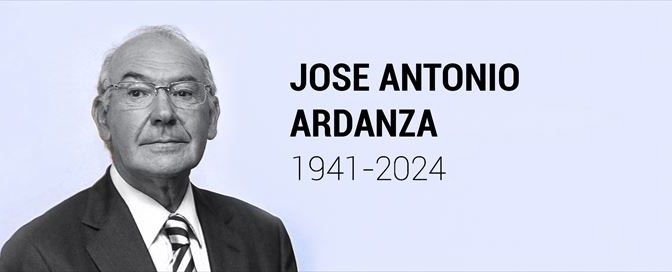When I lived in the Basque Country, during the years 1991-1992, Jose Antonio Ardanza was the face of the nation. Being a young kid who knew little about the politics of Euskadi, I didn’t really appreciate all of the intricacies and nuances of regional politics, but Ardanza somehow was this presence that sort of served as a backdrop to what was going on. The third Lehendakari – President – of the Basque Autonomous Community since the reestablishment of democracy in Spain, Ardanza died on April 8, 2024.

- José Antonio Ardanza Garro was born on June 10, 1941, in Elorrio, Bizkaia. In 1961, he joined the youth branch of the Basque Nationalist Party (EAJ/PNV), the Euzko Gaztedi. A few years later he and several of his friends were arrested for playing the txistu at a town’s fiesta. He managed to escape and remained in hiding to avoid detention.
- His studies took him from the Diocesan Seminary of Derio to the Jesuits of Durango and then to the University of Deusto, where he graduated with a degree in law. When the Basque Nationalist Party was legalized in 1979, he immediately joined. In the very first elections after Franco’s death, in 1979, he was elected mayor of Arrasate/Mondragón and then, in 1983, he was elected General Deputy of Gipuzkoa.
- Only a year later, after then Lehendakari Carlos Garaikoetxea had been dismissed, Ardanza was proposed as a candidate for Lehendakari. He was selected, becoming the third Lehendakari of the post-Franco Basque Autonomous Community (BAC), a position he held from January 1985 to January 1999. He was the longest serving Lehendakari.
- Ardanza was recognized for his ability to bring differing groups together. One of his early milestones was the Ajuria Enea Pact of 1988, which united most of the political parties (minus Herri Batasuna) against the violence of ETA. He also helped consolidate governmental powers in the BAC, creating the Basque police Ertzaintza. And, he helped navigate the difficult economic times the BAC experienced after Franco’s dictatorship. One achievement was signing the agreement that would bring the Guggenheim Museum to Bilbo.
- After his retirement from politics in 1999, he became president of the Basque telecommunications company Euskaltel, which he held until 2011.
A full list of all of Buber’s Basque Facts of the Week can be found in the Archive.
Primary sources: Arozamena Ayala, Ainhoa. Ardanza Garro, José Antonio. Auñamendi Encyclopedia. Available at: https://aunamendi.eusko-ikaskuntza.eus/en/ardanza-garro-jose-antonio/ar-8438/; José Antonio Ardanza, Wikipedia;


